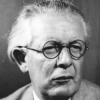Jean Piaget

Jean Piaget
Jean Piagetwas a Swiss clinical psychologist known for his pioneering work in child development. Piaget's theory of cognitive development and epistemological view are together called "genetic epistemology"...
NationalitySwiss
ProfessionScientist
Date of Birth9 August 1896
CityNeuchatel, Switzerland
CountrySwitzerland
capable create education goal inventive men principle repeating simply
The principle goal of education is to create men who are capable of doing new things, not simply of repeating what other generations have done -- men who are creative, inventive and discoverers.
capable creating creativity critical education goal inventive men principal repeating schools simply women
The principal goal of education in the schools should be creating men and women who are capable of doing new things, not simply repeating what other generations have done; men and women who are creative, inventive and discoverers, who can be critical and verify, and not accept, everything they are offered.
knowledge system
Knowledge, then, is a system of transformations that become progressively adequate.
becomes begins capable child objective practical purely recall starting subjective
We recall how, starting with purely practical and quasi-physiological groups, the child begins by elaborating subjective groups, then arrives at objective groups, and only then becomes capable of representative groups.
aggregate built connected objective objects permanent placed relations subject time
From this time on, the universe is built up into an aggregate of permanent objects connected by causal relations that are independent of the subject and are placed in objective space and time.
call objects refer second shall term type using
The first type of abstraction from objects I shall refer to as simple abstraction, but the second type I shall call reflective abstraction, using this term in a double sense.
actions individual time
On the one hand, there are individual actions such as throwing, pushing, touching, rubbing. It is these individual actions that give rise most of the time to abstraction from objects.
children thinking small-numbers
Much research in psychology has been more concerned with how large groups of people behave than about the particular ways in which each individual person thinks... too statistical. I find this disappointing because, in my view of the history of psychology, far more was learned, for example, when Jean Piaget spent several years observing the ways that three children developed, or when Sigmund Freud took several years to examine the thinking of a rather small number of patients.
children eye light
The discussion of the game of marbles seems to have led us into rather deep waters. But in the eyes of children the history of the game of marbles has quite as much importance as the history of religion or of forms of government. It Is a history, moreover, that is magnificently spontaneous; and it was therefore perhaps not entirely useless to seek to throw light on the child's judgment of moral value by a preliminary study of the social behaviour of children amongst themselves.
taken psychology logical
Logical positivists have never taken psychology into account in their epistemology, but they affirm that logical beings and mathematical beings are nothing but linguistic structures.
religious children unique
There is little mysticism without an element of transcendence, and conversely, there is no transcendence without a certain degree of egocentrism. It may be that the genesis of these experiences is to be sought in the unique situation of the very young child in relation to adults. The theory of the filial origin of the religious sense seems to us singularly convincing in this connection.
gaps novelty problem
The more the schemata are differentiated, the smaller the gap between the new and the familiar becomes, so that novelty, instead of constituting an annoyance avoided by the subject, becomes a problem and invites searching.
practice games adults
As far as the game of marbles is concerned, there is therefore no contradiction between the egocentric practice of games and the mystical respect entertained for rules. This respect is the mark of a mentality fashioned, not by free cooperation between equals, but by adult constraint.
self games common
Before games are played in common, no rules in the proper sense can come into existence. Regularities and ritualized schemas are already there, but these rites, being the work of the individual, cannot call forth that submission to something superior to the self which characterizes the appearance of any rule.